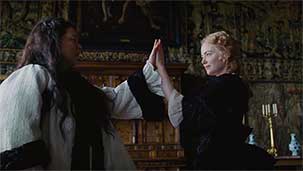Dear Fellow Critics,
At this point, you’ve all written enough about Yorgos Lanthimos’ The Favourite that it would be a waste of my time to echo your praise for its excellent script, mighty performances, and pitch-perfect exploration of gender and power. And while I loved The Favourite for all the same reasons the rest of you did, the thing that makes it my favourite film of 2018 is, quite simply, its kindness.
The Favourite is up for Best Picture, along with two other films that fictionalize the lives of real people. But I wouldn’t go so far as to call it a biopic (even though, ironically, it’s far more caring and respectful of its subjects). Which is good, because I have a serious hate-on for the Hollywood biopic. Often sold as tribute or homage, I am constantly astounded at the blitheness with which their creators malign and disrespect their subjects in the name of creative license, or use the life stories of marginalized people to foreground and reinforce heteropatriarchal norms. Apologies for mangling perfectly good Fall Out Boy lyrics, but these ain’t homages, they’re goddamn drive-bys. And the way these films are often fêted during awards season makes me want to set my hair on fire; Films like The Iron Lady, a portrayal of Margaret Thatcher that was more faithful to the Spitting Image puppet version of Margaret Thatcher, and The Imitation Game, which… don’t even get me started.
This year’s big biopics are Bohemian Rhapsody and Green Book. The former boasts a puzzling portrayal of Freddie Mercury I can only describe as “Depressed Austin Powers”—a so-called tribute that depicts Mercury as a fucked-up degenerate and his bandmates as disapproving choir boys. The latter is perhaps the most aggravating type of Hollywood biopic – about which I have already bitched at length* – that takes the life story of a notable marginalized person and then pulls a bait-and-switch, instead foregrounding the perspectives and experiences of straight, white, usually male characters, relegating the subject of the “homage” to a supporting character in their own story.
What is most galling about this genre is that, when attempts are made to correct or clarify the depictions of people who, conveniently, are no longer around to speak for themselves, the producers, directors, writers, and stars wave them away by citing “creative licence” and the need to craft a narrative that will draw an audience in without sanitizing history (a concern that is selective at best), an excuse at which I call total shenanigans. While I have no issue with massaging chronology or reading between the lines of established historical narratives, I just can’t get behind the idea that trashing the memory of the dead is the key to spinning a good yarn.
So now let me circle back to The Favourite. Its characters were real-life people, but it takes creative license to a whole other level, caring very little, if at all, for historical accuracy. It casts its three leading characters in a truly unflattering light, and there is little to no evidence to suggest any of the terrible things they do actually happened. And, let’s face it, while people might care about getting the story of Freddie Mercury’s life right, very few will even know enough to give a shit about an accurate portrayal of a relatively obscure 17th century British monarch, particularly in a story about three women fighting over something that isn’t a man. And yet, each of the women in The Favourite is written and portrayed with nuance and care, even when the plot hits its most absurd beats. We see Queen Anne, Sarah, and Abigail in their most vulnerable and relatable moments, as well as their most devious and selfish ones. Their sheer emotional brutality filled me with a kind of delighted revulsion, and damn it if I didn’t straight-up love all three of them.
(And yes, I realize how weird it is that a Yorgos Lanthimos movie is my best example of narrative warmth and compassion in 2018, but there you have it.)
The makers of awful Hollywood biopics insist that a little light character assassination is unavoidable, but The Favourite proves that it is possible to take creative license to its very extremes, to craft a warts-and-all portrayal of your subject that is an act of compassion and not a caricature—something that doesn’t erase them from (or relegate them to) the margins of the narrative.
Best,

Nat




